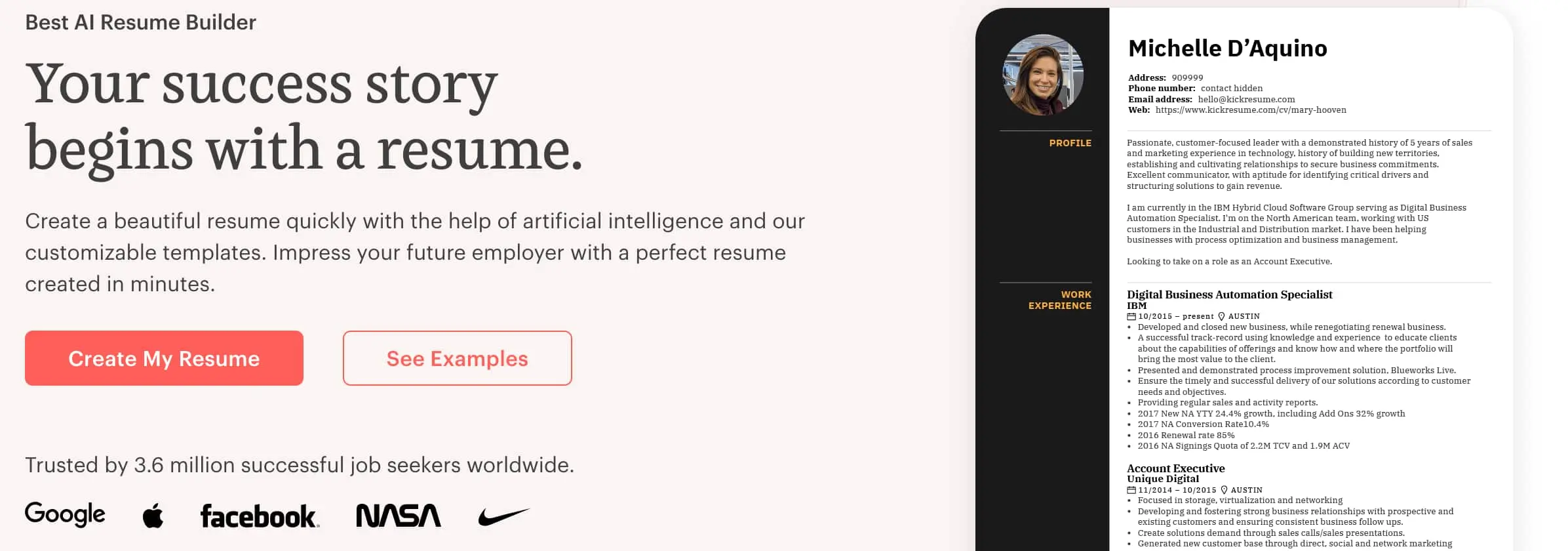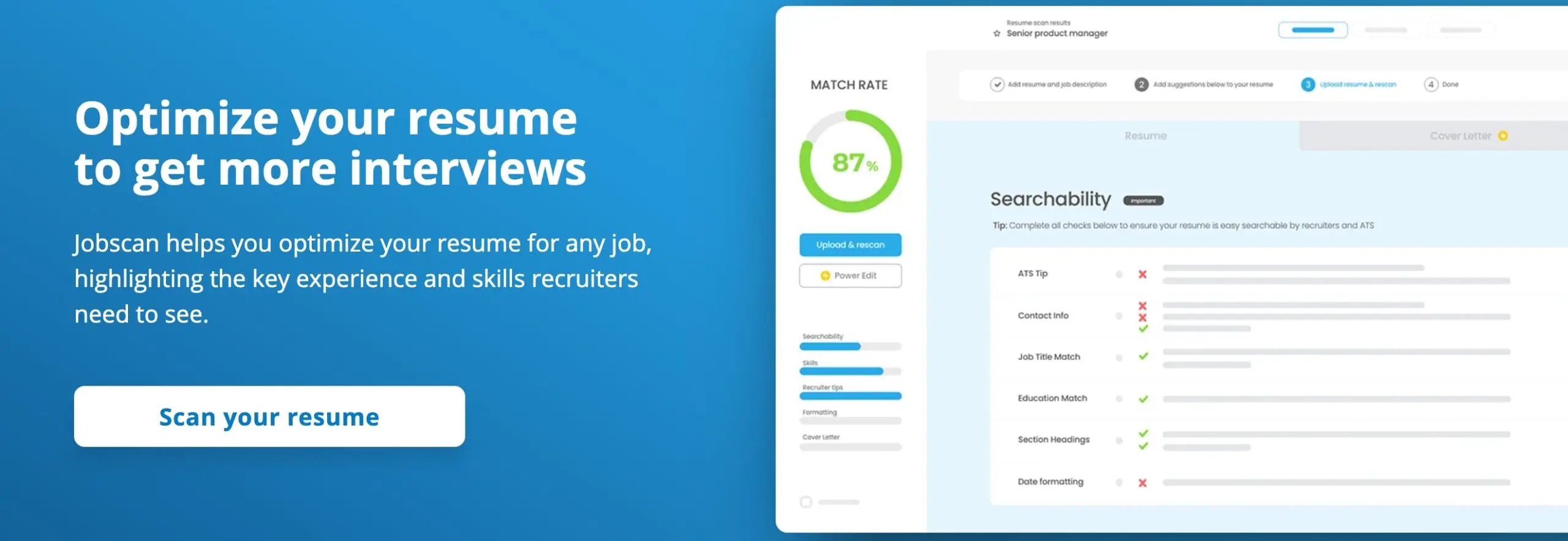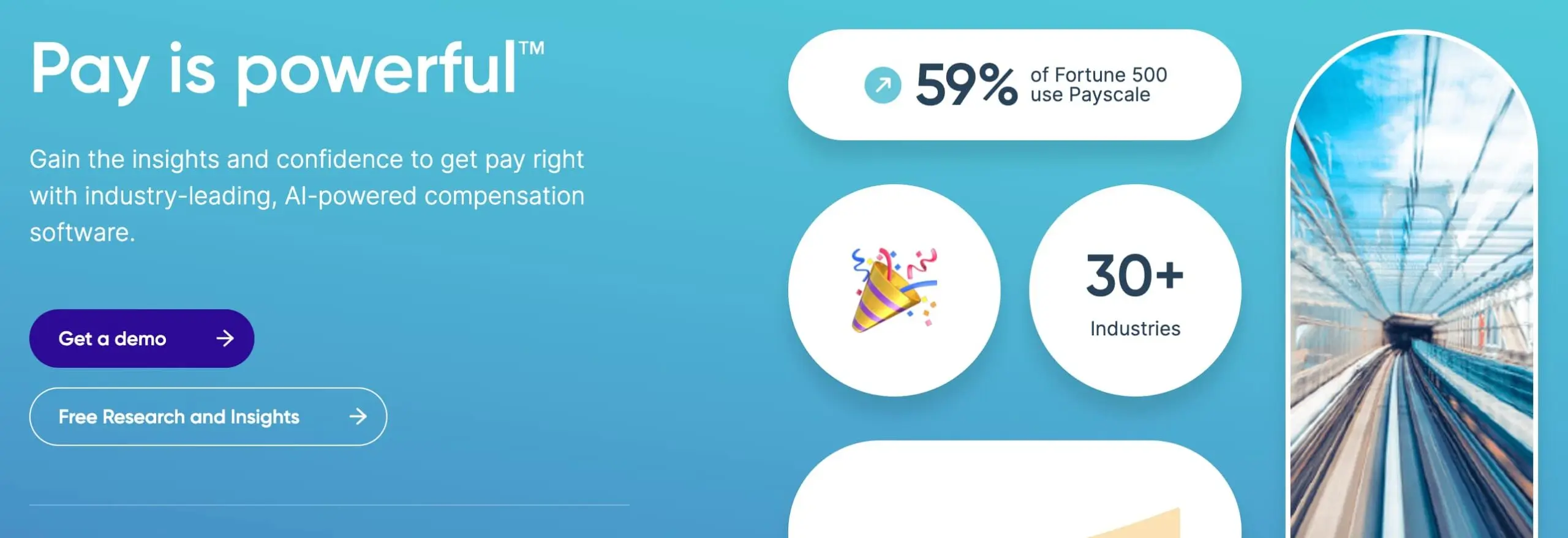Embarking on a job search has always presented its challenges. However, with the dawn of artificial intelligence (AI), the modern job market has taken on a new and exciting dimension.
While the evolving nature of work has always called for a carefully tailored approach to job search, AI offers myriad new ways to streamline the process and stand out from the competition.
According to a recent study by Tidio, 89% of recruiters believed AI could help job candidates with the application process. This group has been an early adopter of AI, and considering their perspective holds substantial weight, we can expect a promising future for job search AI.
AI’s accessibility, even for the inexperienced, means you don’t need to be super tech-savvy to succeed. From AI job search tools that will enhance your hunt to using it to prepare for an all-important interview, this guide covers it all.
We’ll explore:
- AI job search tools
- AI tools to ace the job interview
- AI job search tips to find (and get) a job
- Key takeaways
Ready to harness AI in your job search? Let’s dive in.
AI job search tools
1. Kickresume for resume and cover letter generation
Naturally, you want a resume that pops. Kickresume is an online AI platform that creates professional resumes and cover letters, offering various templates and tools for customizing these documents.
Notably, its AI resume builder and AI cover letter builder (powered by the large language model GPT-4—the same one behind ChatGPT) will draft the documents for you based on your job title alone.
Alternatively, you might want to import data from LinkedIn or another source to ensure the content is as accurate as possible on the first draft. Kickresume also offers tips and guidance for effective resume writing and will ensure your resume is ATS-friendly.
Kickresume is just one of many options available here, and many new tools are emerging in this area. Other leading tools currently include Rezi and Skillroads.
Alternatively, if you prefer to roll up your sleeves and get editing yourself—it certainly gives things a more personal touch—a tool like Grammarly can help. It’s also free, which is a bonus.
And be sure to try out ChatGPT for resume writing with the help of our complete guide.
(Need a primer on ChatGPT? Read our full guide to how to use ChatGPT.)

2. Talentprise for job matching
Okay, you’ve got your basic resume ready to go. Next up, it’s time to find some jobs to apply for! Enter Talentprise, one of the first—and currently leading—AI job search assistants. Talentprise matches you to job listings that align with your career objectives.
You’ll start by completing a questionnaire that focuses on your preferences (location, preferred salary, and so on), and by uploading basic resume information, including your experience, education, and skills.
Next, you’ll complete a short assessment to determine your personality traits and work values.
All this then feeds into a profile that matches you against relevant job roles in Talentprise’s database, alerting recruiters when you match.
This new AI-driven approach saves lots of time you’d otherwise spend trawling endless listings to filter out jobs that aren’t right for you.
Again, it’s good to know that other AI job search tools are emerging in this area. Over time, you can expect these to cater to increasingly niche job markets. For instance, if you’re looking specifically for remote roles, Pyjama Jobs (Kickresume’s job matching platform) already does this.
Keep your eyes peeled for new tools that better fit your industry or career goals.
3. Jobscan for resume optimization
Right, you’ve lined up a few potential jobs, and your resume is ready to go … but does it really match the jobs? Even with the best-written resume in the world, without the right keywords, applicant tracking systems will filter out your application long before it falls upon human eyes.
While this is an unfortunate quirk of the 21st-century job hunt, luckily there are AI job search tools to help here.
Jobscan will spot the keywords that are missing from your resume, cover letter, or social media profile. It is similar to tools used by digital marketers to optimize web content for search engines.
However, in this case, it optimizes your job application for recruiters. Jobscan will compare your application documents against keywords in your chosen job description and create a report highlighting how your documents are faring.
The report includes improvement tips to help you perfect your application.
Again, other options are available, including tools like Skillsyncer. Ultimately, all these tools aim to ensure your application lands in the “interview” pile.
Learn more: How to use AI to write a cover letter

AI tools to ace the job interview
Okay, let’s assume you’ve got the call: you applied for a job and got invited to an interview. Great news! But now the nerves kick in. Surely you can’t rely on AI to help you once you’re face-to-face with an employer … can you? In fact, yes you can. There are emerging AI job search tools to help here, too.
Let’s explore a few, starting with:
1. Adzuna Prepper AI interview preparation
Nobody can predict precisely what questions you’ll be asked in an interview, but you can make some informed guesses. Adzuna Prepper is an excellent, free AI job search tool that automatically generates interview questions and model answers.
Simply input the job title, job description, and company name and it will automatically offer up some practice questions for you to answer.
You can choose the difficulty of the questions it asks, and once you’ve provided your answer (by typing it) you’ll get constructive feedback so you know where to improve.
It’s not perfect, but for a free tool that exists where no such tool existed just a year ago, it’s decidedly better than nothing!
2. Interview Warmup from Google
Following similar principles to Adzuna, Interview Warmup from Google will help you prep for an interview, but this time, in several specific sectors.
These are data analytics, digital marketing and e-commerce, IT support, project management, UX design, and cyber security (for good measure, they also have a “general” category).
The great thing about this job search AI tool is that it asks you questions out loud and allows you to answer by speaking, mimicking a genuine interview.
In this regard, Interview Warmup is much more naturalistic than Adzuna. It transcribes your answers and provides detailed feedback, highlighting areas where you’ve succeeded in answering what an employer might want to know about and flagging areas where you could improve.

3. PayScale for salary negotiation
Of course, not all aspects of the interview process are about giving employers what they want. Answering questions is important, but another, often-overlooked aspect of job interviews is salary negotiation.
It can be nerve-wracking to walk into a room full of strangers and start demanding a competitive salary. However, AI job search tools can help.
PayScale, for example, is one AI-driven tool that compares average salaries for different jobs and different locations, allowing you to really drill down into the specifics.
Its vast database provides unique insights into salary ranges, market trends, and compensation benchmarks so you research and understand the typical salary for the position you’re applying to.
It will help you to consider factors such as experience, education, and skills, too, hopefully giving you the confidence you need to fight for a great salary while making it easier to justify your expectations.

3. AI job search tips to find (and get) a job
Remember, while AI tools can be powerful allies in your job search, it’s important to approach them with a healthy dose of critical thinking and an understanding of their limitations.
Here are some general tips to consider:
Tip #1: It’s not a solve-all
- AI can’t read minds: Be clear and specific in your search criteria. The better you understand your own skills and preferences, the more relevant results AI tools can deliver.
- Don’t rely solely on algorithms: AI prioritizes keywords and may miss hidden gems. Supplement your AI-powered search with traditional methods like networking and direct company applications.
- Human touch matters: Customize your applications based on the specific job and company. Don’t rely on generic AI-generated cover letters.
Tip #2: Optimize your materials
- AI can highlight weaknesses: Tools like Jobscan and SkillSyncer can help identify missing keywords or phrasing that hurts your ATS compatibility. Use their suggestions strategically, but don’t sacrifice human readability for machine optimization.
- Remember the context: Don’t blindly follow every AI suggestion. Adapt their recommendations to your specific experience and tailor them to each job.
- Proofread and personalize: AI-generated content can seem robotic. Edit for clarity and flow, and inject your own voice and personality.
Tip #3: Go beyond the search
- Prepare for interviews: Platforms like Adzuna offer AI-powered interview prep tools. Leverage them to practice and receive feedback, but remember, real human interaction will be key.
- Negotiate like a pro: AI compensation tools like Payscale offer data-driven insights, but consider factors like job market conditions and your unique value to negotiate effectively.
- Don’t let AI automate your humanity: Use AI tools to streamline your search and improve your materials, but never lose sight of your personal story and why you’re the perfect candidate.
Tip #3: Human intelligence first
- Don’t replace, collaborate: Use AI as a tool to enhance your application, not replace your human touch. Personalize AI-generated content and keep it authentic.
- Focus on skills and achievements: Highlight your unique skills and accomplishments in your resume and cover letter, regardless of what the AI suggests.
- Maintain control: You’re in charge of your job search. Use AI’s insights to make informed decisions but remember your priorities and preferences.
Key takeaways
There we have it: everything you need to know about using job search AI to streamline your career change!
Job hunting can be a headache. But as you can see from the tools and tips above, AI can offer a significant edge if you use it right. Naturally, the process will vary based on your strengths and weaknesses. For instance, if crafting words is your forte, resume writing might be a breeze.
In that case, you might want to just use AI to help you tailor your masterpiece! Conversely, if you find the blank page daunting, an AI resume builder can be a great starting point.
Incorporating AI job search tools into your career change journey can transform the whole experience from stressful to manageable.
As this post shows, even at this early stage of AI development, there are several ways you can use AI to make more efficient use of your time.
But always remember: it’s no substitute for your expertise and personal touch. Approach your job search with a strategic mindset and a commitment to presenting the most authentic version of yourself.
If you want to learn more about career change, check out the following guides:
